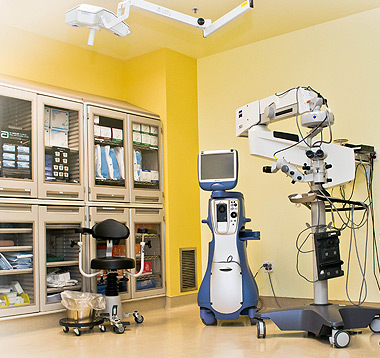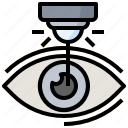For patients having a surgical procedure, please check in 60 minutes before your scheduled time. Because emergency surgeries and other factors can affect scheduling, we ask that you be patient and flexible. Please understand that surgery times are approximate, the nurse or receptionist will inform you and your family of any delays or unexpected interruptions. Delays, although inconvenient, can happen. We appreciate your understanding and cooperation.
At check-in, we will ask you to complete admission forms and sign the surgery consent. We will ask for your insurance card and payment that may be your responsibility (cash, check, and major credit card accepted). In addition to insurance cards and authorization forms, we may ask for a driver’s license or other identification. We request this information from you not only to ensure that your records are always up to date, but also to protect you or your family member from any potential medical identify theft.
In the Pre-operative Unit
In pre-surgery, a nurse will ask you to place your items for safekeeping in a belonging bag. She will help you get comfortable and prepare for surgery. She will review your medical history, medications and supplements, then start an intravenous line.
The anesthesiologist will visit with you in pre-surgery. He will assess your vital signs, lab results or tests, and ask more details about your health history, medications and experience with anesthesia. He will listen to your concerns and answer your questions. Finally, he will determine the type of anesthesia based on your procedure, medical history and your preferences. His goal: keeping you safe, comfortable and pain-free before, during and after surgery.
Before you are taken into surgery, your surgeon will visit with you to ensure you’re prepared, and mark the surgical site on your body.

In the Operating Room
Your comfort and safety are our top priorities. When you first arrive, the lights may seem bright and the temperature cool. A nurse will be close at hand if you’d like an extra warm blanket, or have questions or concerns.
As part of our routine, the surgery team will conduct a “time out” before beginning your surgery. This is our final confirmation that we are doing the correct procedure on the correct site, and that all the necessary instruments and equipment are ready. We also note if you have any allergies to medications and if antibiotics were given.
Into the Post Anesthesia Care Unit
After surgery, you will be taken to the post-anesthesia care unit (PACU) otherwise known as the recovery bay. There you will be monitored closely as the anesthesia wears off. You may feel confused and groggy as the anesthesia wears off. During this time the nurses will check and monitor your heart rhythm, blood pressure, temperature, pulse and breathing. They will also inquire about your level of pain and provide medications as necessary. The surgeon may meet with your family while you are in the recovery bay. Once you are more awake, your vital signs are stable, and your pain is under control, your family will be able to visit with you to begin preparation for your return home.
Going Home
We care deeply about your safety and comfort, we urge you to follow these instructions and all instructions you receive from your doctor/nurse regarding your recovery.
- A person responsible for your care must listen to discharge instructions and accompany you when you leave the Surgery Center. Your surgery will be cancelled if no one arrives with you.
- It is recommended to have a person responsible for your care stay with you for 24 hours after surgery.
- Progress gradually from drinking fluids to eating solid foods.
- Take deep breaths to keep your lungs clear.
- Do not drive or operate machinery for 24 hours after surgery.
- Do not drink alcohol while on prescription drugs.
- Narcotics will cause constipation so you may wish to purchase an over-the-counter remedy in anticipation of this issue.
- Do not make important decisions or sign any legal or important documents within 24 hours after surgery.
We will call you the next day to check how you are doing. Continue to rest until you are fully recovered, following your doctor’s instructions for return to routines and activities.
Here’s to your recovery, health and wellbeing!
Care Agreement
You have the right to help plan your care. Learn about your health condition and how it may be treated. Discuss treatment options with your healthcare providers to decide what care you want to receive. You always have the right to refuse treatment. The above information is an educational aid only. It is not intended as medical advice for individual conditions or treatments. Talk to your doctor, nurse or pharmacist before following any medical regimen to see if it is safe and effective for you.





